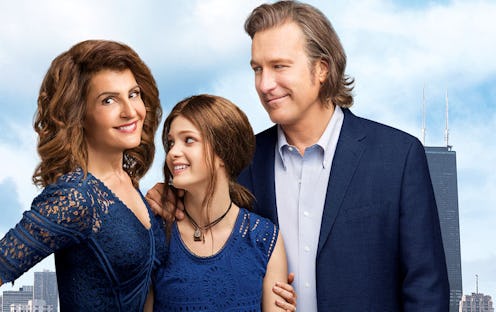
You know her well: the stock teenage girl character in the most generic of family films. She's glued to her phone, and her earbuds are permanently embedded in her ears. I'm delighted to report, however, that My Big Fat Greek Wedding 2 does not fall into this trap. Paris, the 17-year-old daughter of Toula and Ian, isn't the lead of the new film, but she's still permitted to be a fully realized character instead of a set of tired characteristics. As a former teenage girl myself, I'm relieved and overjoyed when female characters in the 12-19 age range are treated with dignity and respect by their script. The sullen teenage girl narrative is tired, and I thank My Big Fat Greek Wedding 2 for not participating in it.
Like the first film, My Big Fat Greek Wedding 2 is written by Nia Vardalos, who also stars as Toula, and both movies do an impressive job of humanizing its characters whose opinions the audience aren't meant to agree with. The first movie showed this through Gus, Toula's father, who didn't want his daughter to go to school, have a job, or to concentrate on anything but marrying and bearing children, but eventually allowed his beliefs to be changed, and the sequel shows this through Paris. Despite having opinions and desires that go against her family's beliefs, Paris knows she has to leave the nest, and grows up in a realistic, complicated way.
It's similar to Toula's own coming-of-age story in the first movie, although Paris is much younger than her mother was back then. In the sequel, Paris is a high school senior in the process of applying for college; she's given the opportunity to stay in state for Northwestern, or to move east to attend NYU. She's frustrated with her extended family's unusual closeness and with their complementary lack of shame, and it's implied, but not really stated, that Paris and teenage Toula had different concepts of familial duty. Paris doesn't feel compelled to stay and tend to her parents, showing a generational variance. But she does feel great affection for her family. She's right there offering to help with Gus and Maria's do-over wedding and aside from some light eye-rolling, she's kind in all her interactions with her relatives. It takes strength on her part to separate the guilt she feels about moving from what she really wants and needs out of her college experience. I'd categorize Paris as an introvert, but her shyness isn't portrayed like some attack teenage girls wage on humanity, like it often is in cliched films.
My favorite moment for this character happens in the halls of her high school. Paris watches from her locker as a boy asks a girl to the prom, not realizing that she just became official with another classmate. (Props to the film for not making that girl into a mean-girl cliche; she takes no joy in rejecting the boy.) Paris, usually shy, swoops in on the adrenaline powered by her obvious crush on this guy, but equally by her discomfort at seeing someone humiliated. She asks him to prom in front of her gawking peers, and he says yes; everyone then goes about their day. It's a short scene and Paris barely speaks, but it tells you pretty much all you need to know about her, and how well the movie treats its young female characters.
Teen girls are so often mocked in popular culture, and so it's both rare and heartening to see a character like Paris in a mainstream comedy — a teenager who strongly subverts harmful stereotypes about young women.
Image: Universal Pictures